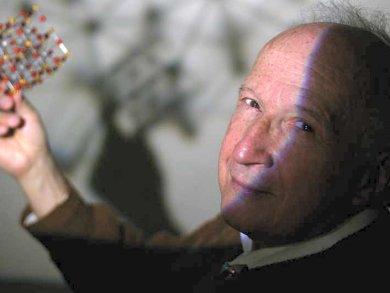Roald Hoffmann celebrates his 75th birthday on July 18th. Hoffmann shared the Nobel Prize in Chemistry in 1981 for his work on the symmetry properties of frontier orbitals and how they determine the course of certain reactions. His research on the theoretical investigation of organic and inorganic substances helped develop computational tools and methods such as the extended Hückel method, which he proposed in 1963. He also developed with Robert Burns Woodward rules for elucidating reaction mechanisms – the Woodward-Hoffmann rules – and introduced the isolobal principle.
Professor Roald Hoffmann studied chemistry at Columbia and Harvard Universities, both USA, and obtained his Ph.D. from Harvard in 1962. He joined Cornell University in 1965 as an Associate Professor and was promoted to full Professor in 1968. He remained at Cornell University until his retirement. He remains an active member of the chemistry community and is a member of the International Advisory Board of Angewandte Chemie.
In addition to being a renowned chemist, Hoffmann has also written poetry, plays, and several books dealing with philosophy and science. To celebrate his birthday, Cornell University is holding a symposium in his honor.
Also of interest:
- Hätte man bloß … von Roald Hoffmann – German theater play
- Webpage of Roald Hoffmann
- The Conservation of Orbital Symmetry,
R. B. Woodward, Roald Hoffmann,
Angew. Chem. Int. Ed. 1969, 8(11), 781–853.
DOI: 10.1002/anie.196907811 
Oxygen: A Play in 2 Acts
C. Djerassi, R. Hoffmann,
What motivates a scientist? One key factor is the pressure from the competition to be the first to discover something new
Wiley-VCH, Weinheim, Germany, 2001.
ISBN: 978-3-527-30413-4



![Synthesis of [c2]Daisy Chains via Mechanochemistry](https://www.chemistryviews.org/wp-content/uploads/2025/04/202504_RotaxanesWithSolidStateMechanochemistry-125x94.png)
